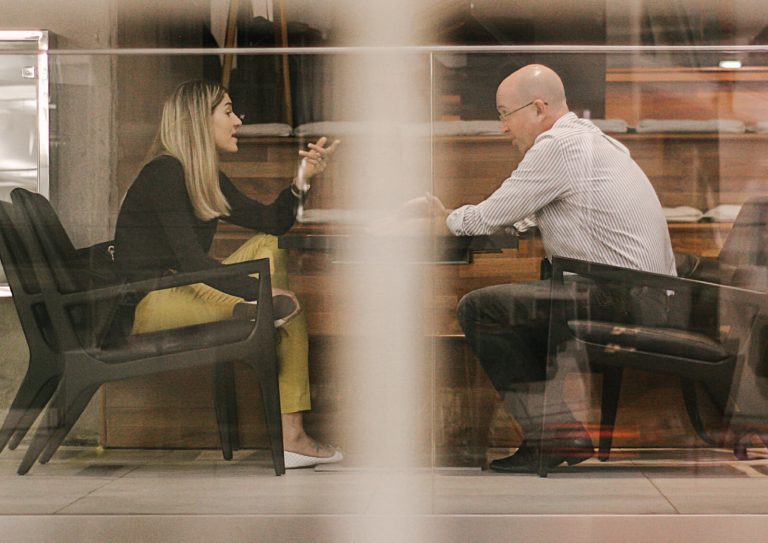Pressure to meet work demands is higher than ever for many of us. But not everyone copes the same way. Some struggle to strike a balance and even get addicted to work. If you’re finding yourself spending more and more time at work – either physically or virtually, if you work remotely – how can you overcome workaholism and protect your relationship from its negative impacts?
Spent another late night at the office? Told your boss you’d just throw down some lunch at your desk while updating that spreadsheet?
Or maybe your work-from-home partner is forever glued to their screen, a vacant look in their eyes as they incessantly check emails, barely making time for exercise and other pastimes.
You may have even half-jokingly asked yourself – “am I a workaholic?”
Just like many other addictions, workaholism can sneak up on you. It may start as a tendency to overwork due to fear of not achieving enough, a desire to prove yourself, or a lack of engagement in other dimensions of life.
Then, before you know it, you find yourself unable to stop working, even though you know it’s harming your health and your relationships.
When ‘busy-ness’ is celebrated
It can be difficult to identify whether or not you’re displaying signs of workaholism. Just like drinking culture, it’s very normalised in society – even glorified.
But researchers have found that there’s a very clear difference between being highly engaged in work, which may sometimes involve long hours, and actually being addicted to work.
The former can have positive impacts on wellbeing and relationships, while the latter, which is the result of internal pressure (not necessarily actual pressure), can have serious negative impacts.
Recognising the signs
Watch out for these indicators of workaholism:
- Difficulty delegating and an unwillingness to reduce your workload
- Feeling negative emotions, such as frustration and low self-esteem, when working but still getting gratification from not stopping
- Working to alleviate or distract from negative emotions such as anxiety, guilt, helplessness or depression
- Becoming stressed if you’re prevented from working
- Thinking a lot about work when not working
- Obsession with work success and status
- Continuing to work long after you set the intention to clock off
- Being a perfectionist at the expense of completing a task
- Hiding the fact you are working from others
- Dreading retirement or time off work
- Skipping meals and not taking good care of yourself
Typical personality traits that may make a person susceptible to workaholism include neuroticism, perfectionism, extreme competitiveness, agreeableness and low confidence, imaginativeness and inventiveness, and being highly action-oriented.
How workaholism impacts relationships
Addictions of any kind reduce intimacy in a relationship. This is because the addiction often takes priority over everything else, compromising other values and commitments.
If workaholism has taken hold of you or your partner, you may notice more irritability, and reduced capacity to engage in things you used to enjoy together. One or both of you may become withdrawn, secretive and have little time for domestic chores, let alone emotional and physical intimacy.
Gradually, this can weaken the connection and erode the goodwill between you, as well as affecting relationships with children. When things aren’t going well on the home front, workaholics may be even more inclined to want to work to distract from dealing with the situation.
If one person has “checked-out” of quality time and home matters, while being forever “on” at work, the relationship can feel very one-sided. This can lead to dissatisfaction, resentment and feelings of isolation.
However, being too antagonistic and accusatory towards your partner, or too hard on yourself, could make matters worse.
What to do if you think workaholism is harming your relationship
Striking a balance between your professional and personal lives as a couple is extremely important for a healthy, happy relationship. Couples can be busy with work while still being mutually supportive and meeting each other’s needs in the home and the relationship.
Here’s how to go about it:
Know you’re not alone
Work stress is common and has been increasing in recent years. A 2021 survey of more than 1900 Australians found 64% per cent of respondents are stressed at least once a week at work. Safe Work Australia also reports work-related stress is having a serious detrimental impact on workers, relationships and employers.
With email and work collaboration apps on our phones, it’s become to mean we’re always theoretically “on” at work. Add to that an increase in work-from-home arrangements post-pandemic and it’s sometimes hard to draw a line between work and our personal lives. This applies even to those who try to keep healthy boundaries, let alone to those with an addiction to overwork.
Take your annual leave
One sign of workaholism is leave-guilt, with employees hoarding leave because they don’t want to miss important developments or let the company down. It doesn’t help that sometimes employers, particularly in small businesses, set the tone of working lots of overtime and not taking holidays.
A holiday can be a wonderful reset and actually improve your performance and enjoyment at work.
Communicate your concern about yourself or your loved one
Talk openly and honestly about how the issue is affecting you with your partner or someone you trust such as a family member, friend or your GP. Go gently if you’re confronting your partner about their patterns of behaviour, especially if they haven’t yet realised they may have a problem. Try to frame the issue in terms of your care for them and the relationship or your family, rather than as wrong doing.
Schedule in decent breaks from work
It is not easy to look away from the screen when you’re addicted, and you may feel like you’re stuck in your desk chair.
Support your intention to have better work habits by drawing up a schedule and keeping it somewhere visible on your desk, setting alarms for lunch breaks and asking a loved one to remind you to call it a day.
Ensure you get fresh air, exercise and do leisure activities
You’ll be surprised how changing your focus and environment and moving your body can break the cycle of compulsive working. Multiple recent studies continue to prove just how important incidental exercise and hitting our step count is for our longevity.
Try to have a digital detox
In the evenings and on weekends where possible, put the phone away and switch the computer off. Workaholism has been exacerbated in recent years by another common addiction – our smartphones. Work is always just a tap away, so set some healthy boundaries around technology, take control and put the phone in your desk drawer after a certain hour.
Focus on the quality – not quantity – of time together
If you must work long hours, or while you are weaning yourself off your addiction, try to switch off from work and share in activities you both enjoy when you’re not working. A 2015 study found couples can form a strong bond even if they spend a lot of hours working by making the most of their moments together.
Having realistic expectations and being understanding about what you can each do on a personal and domestic level also helps create a sense of teamwork.
Reach out for support
If you feel that you or your loved one is struggling to separate your work and personal life in a healthy way, perhaps consider counselling.
Relationships Australia NSW has counsellors who can offer support and help you overcome workaholism and the impact that work stress may be having on your relationships. Get in touch with us about our One-to-one Counselling services today.
Related Services & Workshops

Accidental Counsellor
Accidental Counsellor is a workshop to assist people who aren’t trained counsellors, but often find themselves in a counselling role “by accident”. You’ll learn how to support clients, friends, family, colleagues, and strangers in distress or experiencing a crisis.

Counselling.Individuals.Older People.LGBTQIA+
Individual Counselling
Life can be full of ups and downs. While we may be able to overcome most challenges by ourselves, sometimes we need some extra support. Individual Counselling offers a supportive environment to identify and manage problems and concerns.






